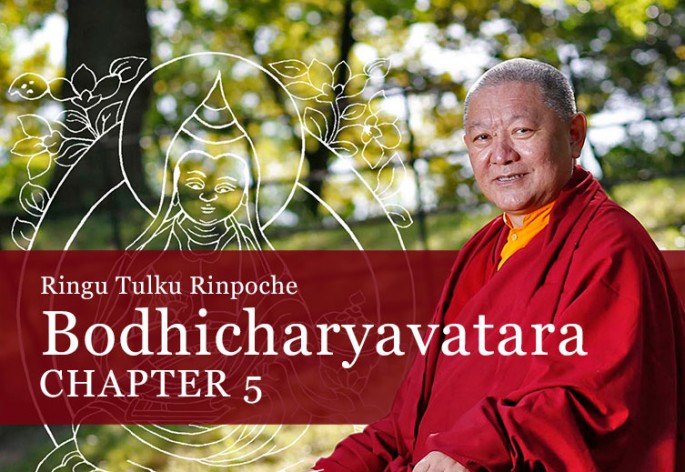BA5_18-22 Resolving to Guard the Mind
With video BA5_18-22 Rinpoche explains stanzas 18 to 22 of the fifth chapter of the Bodhicharyavatara. Now that we understand that all negative things – the sources of our suffering and pain – as well as all positive things – the sources of our happiness, peace and liberation – both are our mind itself, it is important to train and guard the mind. Guarding the mind with mindfulness and vigilant introspection is the discipline and the practice of dharma.
To view the video, simply click on the image to view all the Chapter 5 videos.
If you prefer listening to the teaching in audio, use the audio player below.
The audio as well as the audio translations in different languages and the transcript of this teaching are all available on Chapter 5 page.
We are also studying the commentary transcript on Chapter 5, which you can download here and in the Library section. Further recommended reading: the commentary book by Kunzang Pelden (Khenpo Kunpal), The Nectar of Manjushri’s Speech, p. 170-172.
You’re questions are most welcome. Please log in and leave your questions for Rinpoche as a comment below, or send them via email to studyquestions[at]bodhicharya.org. It is helpful if you can use one short paragraph and, if possible, less than 80 words. Any questions longer than that may have to be edited so please be concise. Questions will be collected from here on Friday, May 18, 2012, and included in Rinpoche’s answers video. After that date please send any questions relating to this video teaching via email to studyquestions[at]bodhicharya.org.
If you would like to volunteer in making transcripts of Rinpoche’s online teachings, or in making audio translations to your own language, please email us at shedra[at]bodhicharya.org.
If you would like to make a personal offering to Rinpoche along with a message, please use the button below:
You can find out more about how to support the archive, while gaining access to Rinpoche's online teachings, using the button below.

Dear Rinpoche, thank you for these very important teachings. I have two questions.
The first question is about stanzas 19 and 20 in which Shantideva refers to the mind as a wound. Does he mean that just the samsaric mind is a wound in the sense of the 3 poisons, because the true nature of the mind surely is not a wound in any sense?
The second question is about stanza 22. Does this mean that if you are having a very difficult time because of losing your job or finding that you have a serious illness, the best way to deal with this is to be vigilant and careful about your state of mind, then you are better able to deal with the practical aspects?
kindest regards, Lynda